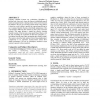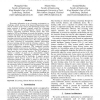53 search results - page 7 / 11 » Adapting Reinforcement Learning for Trust: Effective Modelin... |
HCW
1999
IEEE
13 years 11 months ago
1999
IEEE
A framework for task assignment in heterogeneous computing systems is presented in this work. The framework is based on a learning automata model. The proposed model can be used f...
IWCLS
2007
Springer
14 years 1 months ago
2007
Springer
Learning Classifier Systems use evolutionary algorithms to facilitate rule- discovery, where rule fitness is traditionally payoff based and assigned under a sharing scheme. Most c...
ICRA
2010
IEEE
13 years 6 months ago
2010
IEEE
Multi-robot systems researchers have been investigating adaptive coordination methods for improving spatial coordination in teams. Such methods adapt the coordination method to th...
CCECE
2006
IEEE
14 years 1 months ago
2006
IEEE
Presenting information to an e-learning environment is a challenge, mostly, because ofthe hypertextlhypermedia nature and the richness ofthe context and information provides. This...
HICSS
2003
IEEE
14 years 23 days ago
2003
IEEE
Basically, instrumental conditioning is learning through consequences: Behavior that produces positive results (high “instrumental response”) is reinforced, and that which pro...


